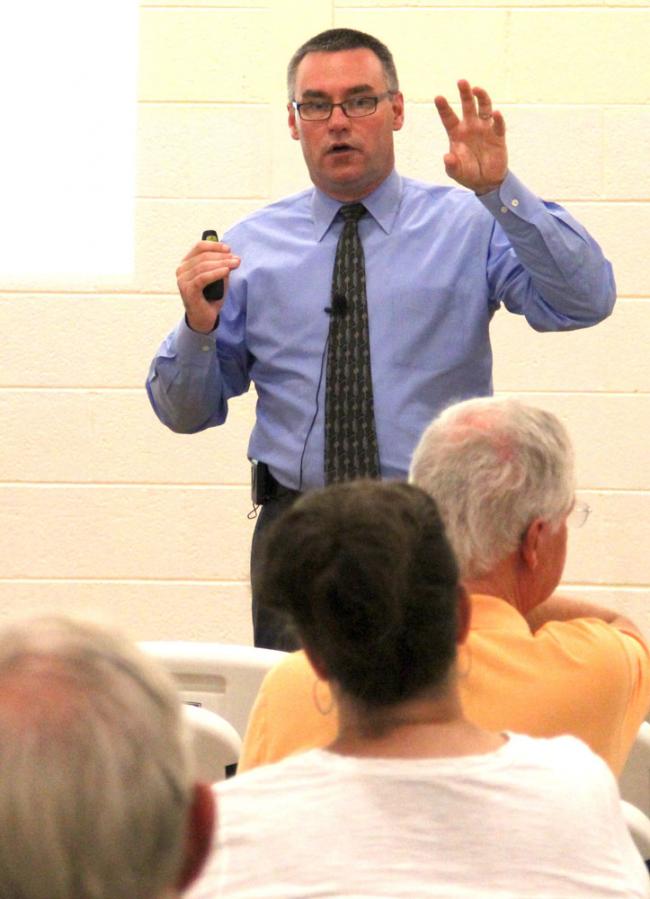Proposal to raise Normandy Park taxes examined
Normandy Park City Manager Doug Schulze explains levy lid lift proposal.
Tue, 08/28/2012
By Gwen Davis
SPECIAL TO THE TIMES/NEWS
The city of Normandy Park is facing serious financial problems.
The cost of running the city has become more expensive while the city’s revenue has not been rising fast enough to cover increased costs.
Dozens of concerned Normandy Park residents flooded a second in a series of informational meetings last week about a levy lid lift proposal that could bring relief. City manager Doug Schulze explained the situation in detail using a PowerPoint presentation and handouts.
The levy will increase property taxes, he said. Currently, residents pay approximately $1.31 per $1,000 of assessed property value. The increase will cost an additional $0.29 per $1,000 of assessed property value.
Practically speaking, a resident living in a home valued at $500,000, would pay an additional $12.19 per month, amounting to an added $146.23 per year.
This tax increase is important.
A state law caps property tax increases at one percent annually. It is this inability for the city to increase property taxes that is mainly why Normandy Park is in such financial trouble. Only a voter-approved levy would enable the city to increase the tax.
While current property taxes help the city, the cap prevents the property taxes from keeping up with inflation, according to Schulze. Since 2002, inflation has gone up by 26 percent while taxes have only gone up by eight percent.
The additional revenue would be used for daily operations of the city, including police services, court services, general liability and property insurance, animal control, road and facility maintenance and administrative and finance services.
Normandy Park has implemented cost-saving measures over the past several years, Schulze said. It has cut services since 2007, capping costs at $4 million per year. The city downsized staffing levels to 17 percent below minimum, froze wages beginning in 2010, implemented a business license fee, deferred street and facility maintenance, refinanced city-issued bonds, increased the stormwater utility fee, among others. The city also outsourced services to other cities such as parks maintenance and senior services.
These measures have produced actual savings of $2.1 million dollars.
However, it is not enough it close the gap between revenue and costs. It is estimated that within three years the city will not have enough funding to legally operate, city staffers say.
Schulze explained how most of residents’ tax dollars do not go to Normandy Park but instead to King County. Only $0.09 of every dollar in taxes goes to the city. In other words, a piece of property assessed at $500,000 costs $6,965 of which only $655 goes to the city.
The city manager also cleared up possible confusion about why specific construction projects within the city have been operating, despite that the city is broke. Normandy Park currently receives grant money for specific projects, he said. The Beaconsfield on the Puget Sound, Manhattan Village Subarea Plan, 1st Ave. S. enhancement projects, for example, are 100 percent paid for with grant funding. Likewise, the new backhoe that was recently purchased was paid for by the Public Works Department.
Grant funding cannot be allocated to other city costs.
Attendees, at the end of the presentation, asked if the city will be OK if the levy passes and what will happen if the levy does not pass?
Schulze, along with Cherie Gibson, city finance director, said this is one of multiple permanent solutions to the city’s financial problems.
If the levy does not pass, possible effects include further staff reductions in police services, using joint service contracts, disincorporating as a city and becoming part of unincorporated King County and merging or annexing with another city.
Other attendees had varying comments. One man called extra taxes “dumb” while another expressed appreciation for Normandy Park police. Several people asked Schulze and Gibson to verify numbers, while others questioned the figures. When one attendee commented on how this was a “small” price to pay for continued living in Normandy Park, attendees burst into applause.
It was noted during the meeting that the property tax rate in surrounding cities is $1.60. If the levy does not pass and Normandy Park merges with another city, residents will most likely end up paying the extra $0.29 anyway.


